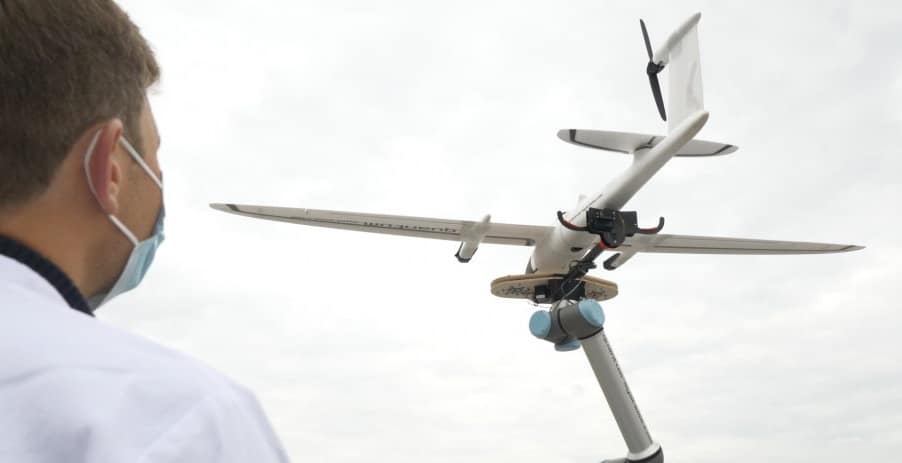



Quantum-Systems GmbH, in conjunction with specialist medical laboratory Becker & Kollegen, has tested the delivery via drone of COVID-19 test samples from the test station at Munich’s Theresienwiese public space to the laboratory four miles away. Urgent samples must be delivered to the laboratory as quickly as possible, especially in situations where a timely test result has a decisive influence on the choice and success of therapeutic measures for a patient.
Quantum-Systems used its autonomous Trinity F90+ drone to transport 20 sample tubes over the 6.4 km (~4 miles) distance in less than seven minutes. With an equivalent journey by van taking an hour or more under normal Munich traffic conditions, this makes transport by drone 8 to 12 times faster, as well as emission-free and virtually noiseless.
“I am concerned about the individual behind each sample and the well-being of the patient in terms of the quality and speed of the findings,” said Marc Becker, M.D. “In this particular case, however, it is also about reducing risks for the many people involved in the provision of our laboratory services, such as doctors, courier services and assistants.”
Robert Hirt, Chief Digital Officer, Laboratoy Becker & Kollegen, commented: “As part of our vision of a No-Touch Sample Distribution (NTSD), our initiative with Quantum-Systems makes an important contribution to the discussion on how we can use automation and digital technology to further reduce analog touch points and the associated potential danger to humans.”
In order to connect drones in flight in real time with the cloud and customer-specific Enterprise Resource Planning (ERP) systems, Quantum-Systems uses software solutions from Auterion. The regulations that must be adhered to for drone delivery missions are currently extensive in Germany, with the responsible aviation authority issuing an individual permit only after a detailed risk analysis has been submitted. In addition, permission for take-off and landing must always be obtained from the respective property owner. For each individual BVLOS (beyond visual line of sight) mission, an additional inspection certificate must be obtained.
In order to further advance the use of drones for medical purposes, Quantum-Systems is currently participating in the tender for a project funded by the Federal Ministry of Transport and Digital Infrastructure (BMVI). The project aims to investigate how changes in drug delivery logistics can lead to significant cost reductions for hospitals.
Quantum-Systems has already been awarded a research contract for another BMVI-funded project called FreeRail, involving the automated recording of vegetation near tracks as well as storm damage along Deutsche Bahn’s rail network. In order to comply with road safety obligations, the vegetation along the entire rail network must be inspected, documented and evaluated by qualified personnel at least once a year. At the same time, rail traffic should not be disrupted during inspection.
The Trinity F90+ drone from Quantum-Systems GmbH is also being used for this project, operating with full autonomy from a self-sufficient drone port, which will be permanently stationed close to the railway line. Using a special communication and data processing system, all collected data can be automatically evaluated and results transmitted to responsible personnel at DB Fahrwegdienste GmbH. The project will provide Quantum-Systems with valuable experience in conducting autonomous BVLOS flights under real-world conditions.
Florian Seibel, Chief Executive Officer, Quantum-Systems GmbH, stated: “For us, the development of the Drone Port is a logical step towards the automation and digitization of flight missions. In the end, the drone will transmit information and data for further decision making. With our technology, we deliver this information just in time.”





Related Posts
New Drone Fires Thales Missile in Unmanned Air Combat Milestone
UAS Startup Accelerator Awards 3M in Funding
US Navy Orders Unmanned Tactical Resupply Aircraft